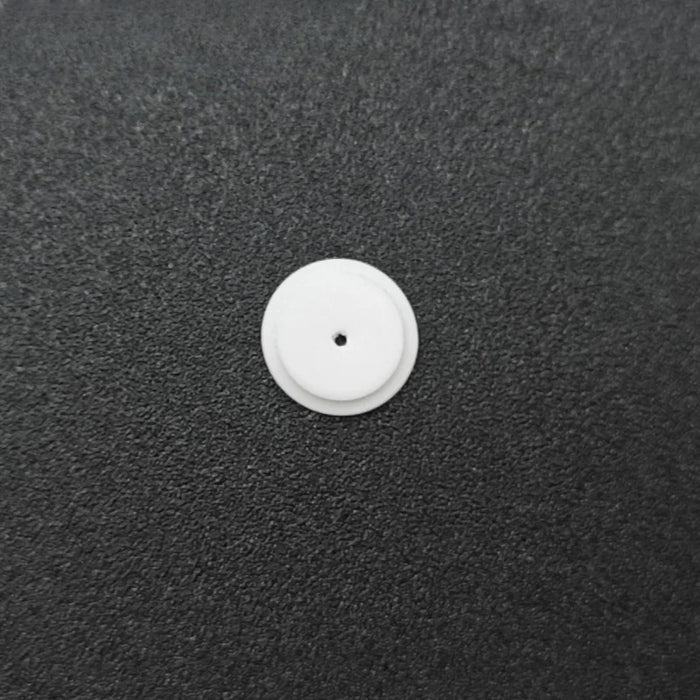

90μL Premium Alumina Ceramic Lid for TA Instruments - Model 960239.901
This high-precision 90μL alumina ceramic lid is engineered specifically for TA Instruments thermal analysis systems, providing exceptional sealing performance and thermal stability for DSC and TGA applications. Manufactured from 99.7% pure alumina ceramic, this lid ensures optimal sample containment while maintaining chemical inertness across extreme temperature ranges.
Key Features & Benefits
- Superior Thermal Stability: Withstands temperatures up to 1600°C without dimensional changes or chemical degradation
- Chemical Inertness: 99.7% pure alumina composition ensures no sample contamination or interference
- Precision Engineering: Manufactured to exact TA Instruments specifications for perfect sealing performance
- Optimal Sample Containment: Designed to prevent sample loss and contamination during thermal analysis
- Enhanced Reproducibility: Consistent thermal contact ensures reliable and repeatable analytical results
- Cost-Effective Solution: Save up to 40% compared to OEM pricing while maintaining analytical precision
Technical Specifications
| Parameter | Specification |
|---|---|
| Volume Capacity | 90 μL |
| Material Composition | 99.7% Pure Alumina (Al₂O₃) |
| Part No. | A-TA-2 Lid for Volume 40ul/90μl ceramic crucible Equivalent to TA 960239.901 |
| Temperature Range | Room temperature to 1600°C |
| Dimensional Tolerance | ±0.01mm |
| Surface Finish | Smooth, non-porous ceramic |
| Density | 3.9 g/cm³ |
| Thermal Conductivity | 25 W/m·K at 20°C |
Compatible TA Instruments Models
Fully Compatible with:
- TA Instruments SDT Q600 Series
- TA Instruments SDT 2960
- TA Instruments Q5000 TGA
- TA Instruments Discovery TGA
- TA Instruments TGA 550/5500 Series
Works with Crucible Models:
- 90μL Alumina Sample Cups (TA 960070.901)
- 40μL Alumina Sample Cups (TA 960072.901)
- Custom volume alumina crucibles
Application Guidelines
Optimal Applications:
- High-Temperature TGA Analysis: Decomposition studies, oxidation resistance testing
- Corrosive Sample Analysis: Acids, bases, and reactive chemicals
- Pharmaceutical Testing: Drug stability, thermal degradation studies
- Polymer Characterization: High-temperature polymer analysis
- Catalyst Research: Catalyst support thermal stability
- Ceramic Material Testing: Sintering studies, phase transitions
Sample Preparation Tips:
- Ensure crucible and lid surfaces are clean and free from contamination
- Use appropriate sample mass (5-50mg) for optimal thermal contact
- Check lid seating to ensure proper thermal equilibrium
- Consider atmosphere compatibility when selecting analysis conditions
Installation & Usage Instructions
Proper Installation Steps:
- Pre-Analysis Preparation:
- Inspect lid for any cracks or damage before use
- Clean lid surface with appropriate solvent (isopropanol recommended)
- Allow to air dry completely to prevent contamination
- Sample Loading:
- Place sample in compatible alumina crucible
- Ensure sample mass is within recommended range (5-50mg)
- Distribute sample evenly across crucible bottom
- Lid Placement:
- Gently place lid on crucible ensuring proper alignment
- Check for complete contact around crucible rim
- Avoid applying excessive pressure that could damage ceramic
- System Loading:
- Carefully transfer sealed crucible to TA Instruments sample holder
- Ensure proper positioning for optimal thermal contact
- Verify atmosphere selection matches lid compatibility
Safety & Handling Precautions:
- Temperature Safety: Use appropriate handling tools when working with high-temperature applications
- Chemical Compatibility: Verify sample compatibility with alumina before analysis
- Storage: Store in clean, dry environment to prevent contamination
- Disposal: Follow laboratory protocols for ceramic waste disposal
- Quality Check: Inspect for damage after each use cycle
Maintenance & Cleaning:
- Clean with mild detergent and deionized water after each use
- For stubborn residues, use ultrasonic cleaning with appropriate solvents
- Avoid abrasive cleaning materials that could damage ceramic surface
- Store in protective containers to prevent mechanical damage
- Replace if any cracks or chips develop
Frequently Asked Questions
Q: Is this lid compatible with all TA Instruments thermal analysis systems?
A: This lid is specifically designed for TA Instruments systems that use 90μL alumina crucibles, including SDT Q600, SDT 2960, TGA 5500/550 series, and Discovery TGA. It's compatible with crucible models 960070.901 and 960072.901. Please verify your specific model requirements before ordering.
Q: What's the maximum temperature this alumina lid can withstand?
A: This premium alumina ceramic lid can withstand temperatures up to 1600°C without thermal degradation or dimensional changes. The 99.7% pure alumina composition ensures exceptional thermal stability across the entire temperature range.
Q: How does this compare to the original TA Instruments lid?
A: Our alumina lid is manufactured to exact TA Instruments specifications with identical dimensional accuracy and material composition. You'll achieve the same analytical performance and reliability while saving up to 40% compared to OEM pricing.
Q: Can I use this lid with corrosive or reactive samples?
A: Yes, the 99.7% pure alumina composition provides excellent chemical inertness, making it suitable for most corrosive samples, acids, bases, and reactive chemicals. Always verify specific chemical compatibility for your application.
Q: How should I clean and maintain this ceramic lid?
A: Clean with mild detergent and deionized water after each use. For stubborn residues, ultrasonic cleaning with appropriate solvents is recommended. Avoid abrasive materials and inspect for damage after each cleaning cycle.
Q: What's the recommended sample mass range for optimal results?
A: For best thermal contact and analytical precision, we recommend sample masses between 5-50mg. This range ensures optimal heat transfer while preventing sample overflow or thermal lag effects.
Q: Do you provide certificates of analysis for these lids?
A: Yes, certificates of analysis including material composition verification, dimensional accuracy testing, and thermal performance validation are available upon request for regulatory compliance and quality assurance purposes.


